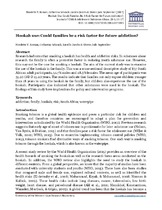| dc.contributor.author | Roman, Nicolette V. | |
| dc.contributor.author | Schenck, Catherina | |
| dc.contributor.author | Jacobs, Liezille | |
| dc.contributor.author | September, Shiron Jade | |
| dc.date.accessioned | 2019-04-29T11:06:36Z | |
| dc.date.available | 2019-04-29T11:06:36Z | |
| dc.date.issued | 2016 | |
| dc.identifier.citation | Roman, N., Schenck, C., Jacobs, L., & September, S. (2016). Hookah Use: Could Families Be A Risk Factor for Future Addiction?. Journal Of Child & Adolescent Substance Abuse, 26(1), 11-17. doi: 10.1080/1067828x.2016.1175985 | en_US |
| dc.identifier.issn | 1547-0652 | |
| dc.identifier.uri | https://doi.org/10.1080/1067828X.2016.1175985 | |
| dc.identifier.uri | http://hdl.handle.net/10566/4658 | |
| dc.description.abstract | Research indicates that smoking a hookah has health and addiction risks. In substance abuse research the family is often a protective factor in reducing youth substance use. However, this may not be the case for smoking a hookah. The aim of the current study was to examine the use of the hookah in the family. This was a cross-sectional descriptive study of 837 South African adult participants, 51.7% males and 48.3% females. The mean age of participants was 35.29 (SD = 15.11) years. The results indicate that families not only expose children younger than 18 years to using the hookah in the family, but children also experience the use of the hookah. Participants also indicated that other substances were used in the hookah. The findings of this study have implications for policy and intervention programs. | en_US |
| dc.language.iso | en | en_US |
| dc.publisher | Taylor & Francis | en_US |
| dc.subject | Addiction | en_US |
| dc.subject | Family | en_US |
| dc.subject | Hookah | en_US |
| dc.subject | Risk | en_US |
| dc.subject | Waterpipe | en_US |
| dc.title | Hookah use: Could families be a risk factor for future addiction? | en_US |
| dc.type | Article | en_US |

